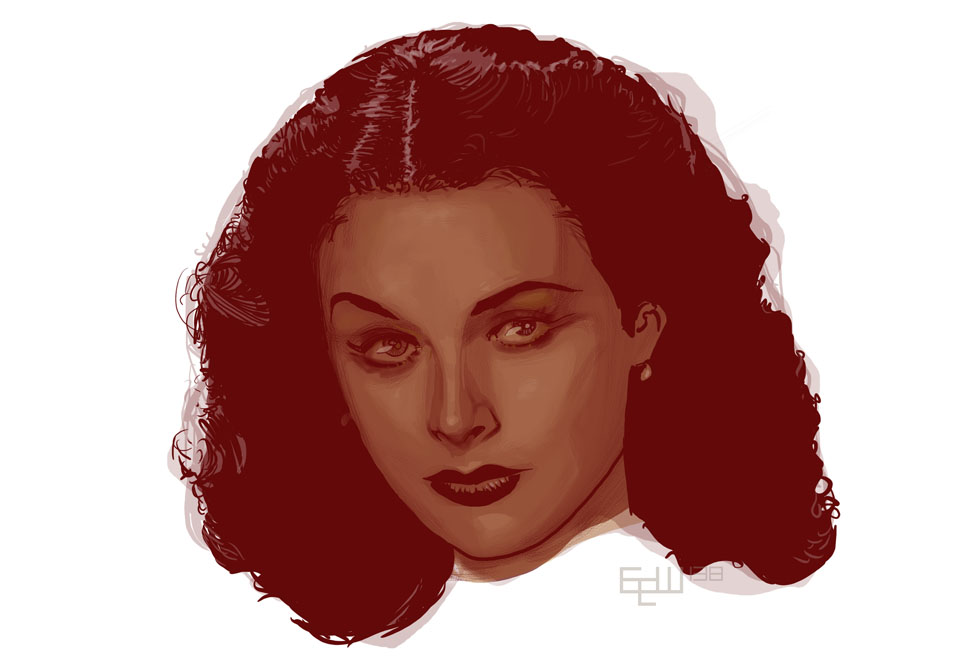The Strange Woman - 1946
Review of Ulmer's 1946 big-budget (for Ulmer) masterpiece
Edgar Ulmer directs this 1946 film (set in 1820 Bangor, Maine) as partially a "noir" thriller-mystery and partially a typical historical-melodrama, with Hedy Lamarr's character of Jenny Hager the mystery, and the melodrama being her career as a scheming woman wresting power from one powerful man after another.
Gene Lockhart is on the screen as Isaiah Poster, one of Jenny's husbands, an old-time New England merchant who is shrewd and (superficially) pious, but no match for Hedy. Jenny Hager eventually plots Poster's murder using the vehicle of Poster's own son, a necessary action so that she can switch teams to another powerful New England businessman played by very restrained George Sanders (as John Evered).
While using obvious Hollywood movie tricks to control the men around her (good looks, perky attitude, strategic helplessness), she is also periodically possessed by a questioning nature primarily directed at herself. She questions why she is doing the things she does: murder, lying, inter-spaced with genuine and sincere acts of charity and kindness. Besides a determined obsession with gaining power, she is also concerned for the poor people who make up the lower classes of the harbor town where she was born.
This self-awareness (episodes of which do not last long enough for the character to change the trajectory of her doom) is a unique aspect of the portrait being drawn by Lamarr and Ulmer. In parts of the film, Hedy's styling of the character seems reminiscent of Vivien Leigh's portrayal of Scarlett O'Hara, but Hedy's Jenny is a more dangerous weapon against weak-kneed men, and produces a higher body-count by the end.
Lamarr's movie career consists of many films where she was mainly required to, as she put it in her own words, 'stand still and look stupid.'* That being the very definition of Hollywood female glamour. The Strange Woman is a tale that turns this credo on its head. The film's budget was well-spent on costuming and sets, and the then 31 year old Lamarr is of course beautifully photographed throughout the tale.
But even the fact of the character's beauty is made into a deficiency when she is confronted by a wild-haired rural preacher in one scene featuring a fire and brimstone sermon at Jenny's church. This raises the question of whether the relative powerlessness of women is made all the worse by their attractiveness.
The screenplay by Herb Meadow (from the novel by Ben Ames Williams) has a pathological undercurrent which is more subtle than Hitchcock but is unavoidable as we witness the adolescent Jenny attempting to playfully drown Ephraim Poster (played by one of Ulmer's own children). When she is interrupted, Jenny twists the story around to where she was rescuing the boy (and he is infatuated and obsessed with her from there on until she actually does get him killed, later).
This murderous pathology is exhibited in an early part of the film concerned with the brutality of Jenny's alcoholic father. Yet within a short space, we discover he is being manipulated by his daughter to an extent, and notably declares after one of Jenny's transgressions that 'I'm going to beat you and you won't like it this time' to which she smiles.
The stripes across her back and shoulders soon prove a handy tool. In fact, it seems there's nothing that happens around Jenny which she cannot find a way to turn to her advantage. But her cleverness also brings her consciousness that the town she lives in, which is frequently invaded by rural loggers and turned into a only slightly veiled cornucopia of drinking establishments and brothels (much to the greedy delight of the respectable businessmen who run the town), is also a hellish place for other poor women.
When Jenny rescues a tavern waitress (played by June Storey) who is about to be "bathed in the river" by a gang of men convinced she may have stolen from them (and they have already burned the tavern where she worked to the ground), Jenny not only salves the girl's wounds but puts her into her old childhood house so that she isn't homeless.
"You're so good Jenny, that's why you've come up in the world" the tavern waitress declares. But we know better.
Footnotes
* Concerning relative standards of stupidity, Hedy Lamarr (born Hedwig Eva Maria Kiesler) is the co-creator of the earliest version of frequency-hopping, a technique now used for cellular phone traffic. She was privy to theoretical ideas about the technique while still in Europe before she fled to America to avoid the Nazis.
*The "strange woman" aspect of this title seems to refer to the perverse nature of Jenny - it's also a reference to Proverbs 5:3.
What's Recent
- Grand Exit - 1935
- Island of Desire - 1951
- Road to Morocco
- The Devil and Miss Jones - 1941
- Sinners - 2025
- Something for the Boys - 1944
- The Mark of Zorro - 1940
- The Woman They Almost Lynched - 1953
- The Cat Girl - 1957
- El Vampiro - 1957
- Adventures of Hajji Baba – 1954
- Shanghai Express 1932
- Pandora's Box – 1929
- Diary of A Chambermaid - 1946
- The City Without Jews - 1924
- The Long Haul
- Midnight, 1939
- Hercules Against the Moon Men, 1964
- Send Me No Flowers - 1964
- Raymie - 1964.
- The Hangman 1959
- Kiss Me, Deadly - 1955
- Dracula's Daughter - 1936
- Crossing Delancey - 1988
- The Scavengers – 1959
- Mr. Hobbs Takes A Vacation - 1962
- Jackpot – 2024
- Surf Party - 1964
- Cyclotrode X – 1966
Original Page Nov 21, 2015 | Updated Feb 17, 2022
